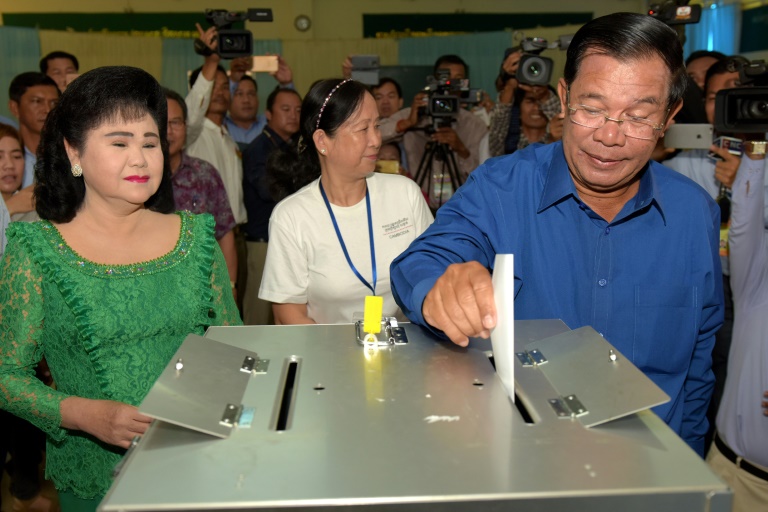Map: Spiking hotspots in and around Pretoria
Opponents of Hun Sen, as well as NGOs and the critical press, have increasingly been smothered by court cases and threats before a crucial general election next year.
Kem Sokha, 64, a veteran opposition politician who has formally led the Cambodia National Rescue Party (CNRP) since March, is accused of conniving in a “secret plan” with foreign entities which began in 1993, according to a court statement.
It said evidence of a conspiracy was substantial enough to charge him under the penal code section for “treason and espionage”, which carries up to 30 years in jail.
Kem Sokha was arrested early Sunday in a swoop by hundreds of security force members at his home in the Cambodian capital.
Hours later Hun Sen — Asia’s longest-serving leader — accused the politician of being in cahoots with the United States.
“Behind his (Kem Sokha’s) hand it is still the same, it is America,” he said, in a typically bombastic speech.
To back up his claims, Hun Sen cited a publicly available 2013 speech by the opposition politician given in Australia in which he said he had received US help to build a pro-democracy movement inside Cambodia.
A report on the speech featured on the pro-government Fresh News website shortly before the arrest.

Hun Sen, a firebrand former Khmer Rouge fighter turned premier, sells himself as the only man who can bind Cambodia together after dragging it from the ashes of civil war
Washington has yet to address the espionage allegation but the State Department said the charges against Kem Sokha “appear to be politically motivated”.
It added that his arrest followed “a number of troubling recent steps” against civil society and the free media that threatened to undermine the credibility of next year’s elections.
UN rights chief Zeid Ra’ad Al Hussein said he was “seriously concerned” by the arrest, adding it “appears to have been carried out with no respect for due process guarantees, including respect for his parliamentary immunity”.
– Electoral challenge –
Kem Sokha’s surprise detention raises the political temperature in Cambodia.
The CNRP had been widely tipped to perform strongly in the 2018 polls, buoyed by the youth vote in a country where many are tired of rampant corruption, inequality and the dwindling respect for human rights.
In February the CNRP’s then-leader Sam Rainsy stepped down after a fresh welter of legal cases against him threatened the party with a ban from politics.
He already lives in France to avoid convictions in Cambodia, which he says are politically motivated.
Kem Sokha later took the helm of the party, but has been buffeted by allegations and threats driven by Hun Sen and backed up by the kingdom’s notoriously pliant courts.
On Monday a re-tweet on Kem Sokha’s official Twitter feed read: “I may lose my freedom, but may freedom never die in Cambodia.”
“The defence team and Kem Sokha cannot accept the charge because it is incorrect,” defence lawyer Sam Sokong told AFP, adding his client had been taken to pre-trial detention at a prison near the eastern border with Vietnam.
Analysts say Hun Sen is determined to extend his three-decade rule and withstand the burgeoning popularity of the CNRP, muffling critics in the media and civil society.
On Monday The Cambodia Daily, one of the last independent newspapers in the kingdom, was shuttered by a tax claim which it says is trumped up to muzzle its critical reporting.
Crackdowns on opposition politicians by the premier are routine before elections but the recent series of charges is unprecedented.
“It seems like all the old rules are out the window,” said Sebastian Strangio, an expert on Cambodian politics, adding Hun Sen’s stranglehold on the kingdom is stronger than ever.
“Deprived of its leader, and harried by government repression, the CNRP will struggle to mount an effective campaign at next year’s election.”
Hun Sen, a firebrand former Khmer Rouge fighter turned premier, sells himself as the only man who can bind Cambodia together after dragging it from the ashes of civil war and bringing impressive economic growth in the last decade.
That argument has traction among many Cambodians, particularly the older generation who remember the fanatical Khmer Rouge regime of the 1970s which left nearly a quarter of the population dead.
Download our app and read this and other great stories on the move. Available for Android and iOS.